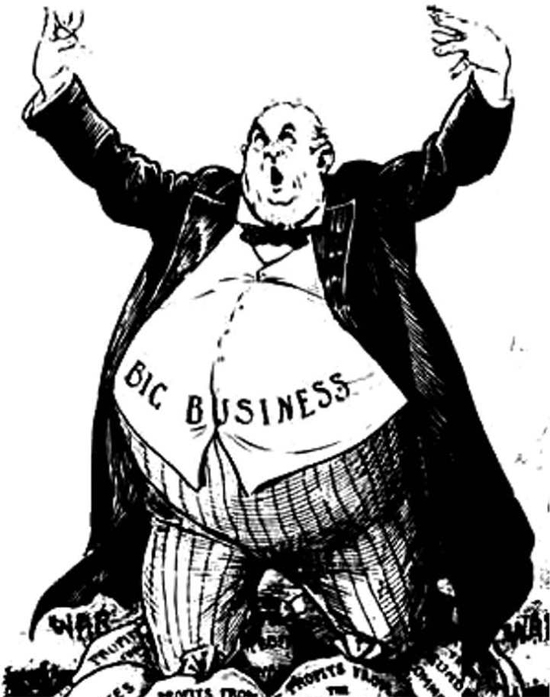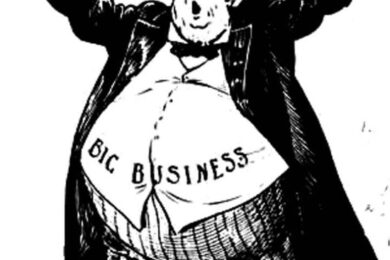Who is this music industry? Everywhere I go these days I hear about this bastard called the music industry who keeps ruining everybody’s fun and blaming it on the kids. The music industry is old fashioned, we hear: a dinosaur, a useless old relic. The music industry is unreasonable, larcenous, preposterous. It’s sexualising our children. Probably a paedophile. Perhaps the News of the World can give me his address so I can go round and have a word. But, without resorting to the pages of Mr Murdoch’s febrile little organ, how else might I go about locating this ‘music industry’ – where might we point the finger so that we can bring the villain to justice? It seems whoever we care to ask, the culprit is always elsewhere. Like Macavity, T. S. Eliot’s feline master criminal, "with movements like a snake" the music industry has always left the scene of the crime before we can lay hands on the blighter.
How about the people who sell music? That sounds reasonable. And yet, if we look for the man at the top of the biggest music retailer in the world – that is, Steve Jobs, CEO of Apple, Inc., the owners and developers of iTunes – we find repeated reference to Mr Jobs "taking on" the music industry, even "killing" the beast. Do they mean he has committed suicide? I don’t think so. His business appears to be in rude health.
OK, so how about the people who make music? One might presume that the producers of a given commodity might be considered a fairly central part of a given industry. Few people would deny that chemists have a role to play in the chemicals industry, milliners in the hat industry. Musicians, then. And yet, just like Mr Jobs, musicians everywhere seem to be complaining about the music industry, railing against its follies and excesses, pointing the finger somewhere else. Nowhere in particular – just so long as it’s somewhere else. It wasn’t me!
The people who buy music, perhaps? They must be in the loop somewhere. Or the people who distribute and promote music? The people who write about music and produce magazine and books about music? But everywhere we look, we find a finger pointing elsewhere. The music industry escapes us, like a spectre, a cipher. This is a problem, not least because, etymologically speaking, the word, ‘industry’ is related to a certain diligence, to labour carried out with care and attention. So, in a sense, when we ask, ‘Who is the music industry?’ we are asking, ‘Who cares about music?’
Evidently, there are an awful lot of people today making use of music in some way or another, maybe more than ever before. But then, a couple of centuries ago, there were an awful lot of people in the American South who were making use of black slaves, but I am not entirely convinced that they cared very deeply for them. The argument is often made these days – I believe it originates with an entrepreneur and brand strategist named Gerd Leonhard – that, today, music is like water. But who cares about water? Only those for whom the supply has broken down.
Recently I decided to take the assertion that ‘music is like water’ seriously. So I stopped paying for my water. When the water company wrote to me and told me they were going to cut me off, I wrote them back and told them they were dinosaurs who didn’t understand the new realities of Web 2.0. Now I just stare at images of waterfalls on YouTube. I listen to the sound of the waves on my iPod. But somehow I’m still thirsty.
Reading some of the arguments currently available regarding the present situation with regard to music, we might find that music is rather less like water and rather more like money. Because money is abstract, easily reduced to a series of ones and zeros and transported around the world on the internet. And the people who claim they love money the most, who gather the greatest amount of it through their own labour, are also the ones most likely to see it as their right to palm off a little bit extra, free of charge.
But we don’t like to think of music as being like money. It’s somehow unseemly to even contemplate them in the same breath. Still, as we hear so often these days, that’s the way things are, like it or lump it, you better get used to the New Reality because things ain’t gonna change. In the collective memory of the British people, the doctrine that There Is No Alternative was until recently most associated with the Thatcher administration in power a quarter of a century ago. There Is No Alternative, we were told, to economic liberalisation, free trade, free markets, and capitalist globalisation. Curiously, many of the same people who a quarter of a century ago insisted that there was, indeed, an alternative, and one worth fighting for, are now parroting the same line, in a different, though perhaps not unrelated, context. If we were able to recognise, twenty-five years ago, that There Is No Alternative was itself not a statement of natural science but a political argument and therefore one open to contestation, why is it that we are blind to the same possibility today?
A quarter of a century ago we were in the midst of an economic recession, unemployment was rising sharply, and public services were being systematically dismantled (sound familiar?). And yet still people found the money to pay for the music they listened to, even though it was much more expensive than it is now. Today, as the musician, independent record label boss and music magazine editor, Chris Cutler, put it in The Wire recently, we pay the plumber and the electrician, we pay the telephone company and the internet service provider, "so why so careless of the musician and the struggling label?" Perhaps he is the music industry everyone is complaining about.
When we hear about people who work in the car industry losing their jobs or having their earnings slashed, we tend to think, how terrible! Something should be done! We don’t tend to think, well, that’ll sort the wheat from the chaff; the best workers, the ones most passionate about cars, will doubtless survive, and anyway, there are too many cars in the world anyway. But we have a strange attitude towards musicians, one that, to a certain degree musicians – and people who write about music – are themselves responsible for. This attitude is best described by the psychoanalytic concept of envy. We cherish a fantasy that musicians are privy to an excessive enjoyment – of life, their work – and we resent them this enjoyment. We do not want what the musician has, but we desperately want them not to have it, and so we harbour a secret desire to destroy their ability to enjoy it, even though this acts against our own best interests. For we all want to continue to be able to listen to music, and deep down we know that our continual enjoyment of music requires musicians who will keep on producing it. And we all deep down know that poverty is a major cause of depression and that depression is a debilitating illness which frustrates your ability to work and to produce. All this we know very well, and yet still. . . We need our myths, our spectres.
Allow me to let you into a little secret: the major multinational record labels are laughing. In some ways, things could not be going better for them. They have been able to get away with things over the last decade that they would never have achieved under other circumstances. The so-called 360 deal is a case in point. This is now the standard on all recording contracts and it gives the label a cut in every stream of revenue a musician might ever hope to tap into, from touring to merchandise to publishing to sync rights. You name it. Before very recently it would have been obvious that you would have to be a total mug to sign such a deal. But now There Is No Alternative.
Of course, they have to have their show trials. But really, that’s all they are. The labels know full well that their claims are often ludicrous, but my God, it’s just such an easy way to make a quick buck – providing you have access to the most expensive lawyers in the world. We may laugh at the RIAA for demanding $75 trillion from LimeWire, but the RIAA walked away from that demand with $105 million, and 105 million dollars is an awful lot of money. So who’s laughing now?
So tough news for LimeWire, those crazy outlaw pirates who were so selflessly providing us all with that free music that we all love so music. How could this bunch of hacker kids possibly afford a $105 million out of court settlement? Well, I guess when you’re owned by Lime Group LLC, a company that also owns a stock brokerage, a hedge fund, and a medical software company, when your creator is less some crazy outlaw hacker kid than a CEO with a personal net worth of $10 million and an MBA from Harvard Business School… I guess the money turns up somehow. And before anyone starts shouting about the benevolence of Spotify, check out who owns Spotify. That’s right – the major multinational record labels, all of whom were given significant shares in the company in exchange for the ludicrously tiny royalty being paid to their artists.
For too long the argument over the future of the music industry has been framed in terms of big, dumb Old Media versus hip, exciting New Media. So when a non-profit organisation representing songwriters like the PRS is in conflict with a massive corporate behemoth like Google, everyone leaps to the defence of Google because Google are seen to be giving us something for nothing. Yet all the while they are making you into their most precious commodity, a commodity to be bought and sold like any other. Such has been the primary purpose of the mass media since its inception – to sell audience to advertisers. There is nothing new in this model. And for the most part, the hip, exciting New Media companies are owned by the same hedge funds and stock brokers as the Old Media companies. BitTorrent, for example, has corporate partnership deals with Fox, Paramount and Warner Brothers.
I’d like to propose an alternative, one of those alternatives that we keep being told don’t exist. You are the music industry. We all are. Because, after all, we all care about music (don’t we?), and we are all implicated in its future. And if we wait for our supply to be cut off it may already be too late. We have been suffering for the last quarter of a century because the last time we were told there was no alternative, too few people insisted otherwise. So perhaps it is time we started, collectively and cooperatively, to take some responsibility for it, instead of waiting for this nebulous ghost called ‘the music industry’ to take responsibility for us.



